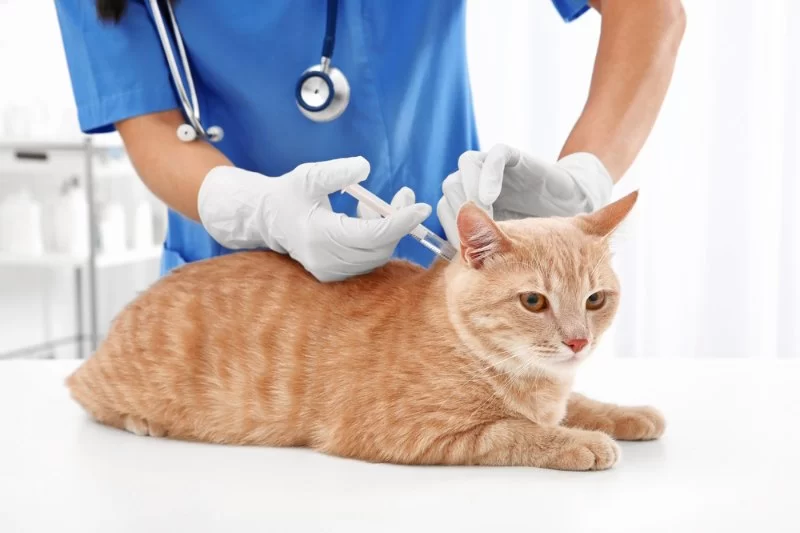- why-cat-vaccinations-matter-in-2025-and-beyond
- updated-2025-feline-booster-schedule-explained
- core-vs-non-core-vaccines-what-your-cat-really-needs
- age-based-vaccine-schedule-kitten-to-senior
- real-life-experiences-why-sticking-to-schedule-matters
- working-with-your-veterinarian-on-customized-care
1. Why Cat Vaccinations Matter in 2025 and Beyond
In today’s evolving veterinary landscape, understanding how often cats should get vaccinated is more important than ever. With outbreaks of feline calicivirus, panleukopenia, and even rabies increasing in various parts of the U.S., staying on schedule with boosters can mean the difference between life and death for your pet.
Vaccines don't just protect your cat—they help shield entire communities, especially in multi-pet homes or shelters. And with 2025’s updated booster guidelines now available, it’s the perfect time to review your cat’s protection plan.
2. Updated 2025 Feline Booster Schedule Explained
2.1 What Changed in the New Recommendations?
The 2025 updates from the American Association of Feline Practitioners (AAFP) emphasize tailored vaccination intervals based on lifestyle and risk assessment. While many adult cats may still follow a three-year protocol for core vaccines, others—especially outdoor cats or those in boarding environments—may need annual boosters for certain diseases.
2.2 Core Vaccine Timeline at a Glance
Core vaccines include FVRCP (feline viral rhinotracheitis, calicivirus, panleukopenia) and rabies. Kittens begin at 6–8 weeks, with boosters every 3–4 weeks until 16–20 weeks. A booster is given one year later, and then every 1–3 years depending on the vaccine used and lifestyle.
3. Core vs. Non-Core Vaccines: What Your Cat Really Needs
3.1 Core Vaccines Every Cat Should Receive
Regardless of whether your cat is an indoor-only cuddle bug or a bold backyard explorer, core vaccines are essential. FVRCP and rabies provide foundational protection against deadly viruses. Rabies vaccination is also legally required in most states.
3.2 Non-Core Options Based on Lifestyle
Non-core vaccines, like FeLV (feline leukemia virus), are recommended for kittens and at-risk cats. If your cat goes outside, interacts with unfamiliar cats, or lives in a high-exposure region, talk to your vet about additional protections. At Hidden Brook Veterinary, we offer vaccine counseling tailored to your cat's environment and habits.
4. Age-Based Vaccine Schedule: Kitten to Senior
4.1 Kittens (6–20 Weeks)
This is the most critical window. Kittens should receive FVRCP starting around 6 weeks, with a series every 3–4 weeks. Rabies is given around 12–16 weeks, depending on local law. FeLV is also often included in early kitten visits.
4.2 Adult Cats (1–7 Years)
Most adult indoor cats will follow a 3-year booster cycle, although some rabies vaccines may still require yearly renewal depending on the brand and state regulations. For outdoor cats, FeLV boosters may be annual.
4.3 Senior Cats (8+ Years)
As cats age, immune response can weaken. Some vets may recommend titer testing to determine immunity levels instead of automatic revaccination. Seniors also may need vaccine schedules adapted due to health conditions like kidney disease.
5. Real-Life Experiences: Why Sticking to Schedule Matters
A client at Hidden Brook Veterinary recently shared how their indoor-only cat, Luna, contracted calicivirus after a foster kitten was introduced without proper vaccinations. Luna had missed her FVRCP booster by just six months. She recovered with intensive care, but it highlighted the importance of not letting the calendar slide.
In another case, an outdoor rescue cat named Marley contracted FeLV at just two years old—his family had delayed the non-core vaccine, thinking he was “probably safe.” The emotional and financial toll reminded everyone in their circle that prevention is much cheaper than treatment.
6. Working with Your Veterinarian on Customized Care
Every cat is unique, and your vet is your best ally in determining which vaccines are necessary and how often. Factors like age, breed, lifestyle, geographic location, and existing health conditions all matter. At Hidden Brook Veterinary, we believe in individualized plans—not one-size-fits-all care.
Ask your vet about combination vaccines to reduce the number of injections per visit, or about vaccine titer testing for cats with chronic conditions. Regular wellness visits also ensure your cat stays current on more than just shots—they’re a chance to catch other issues early, from dental problems to weight concerns.












